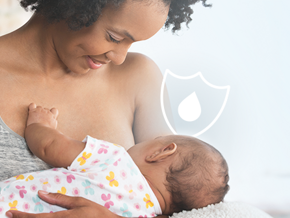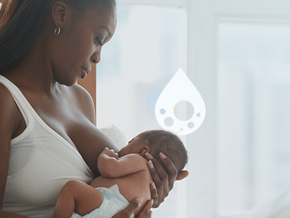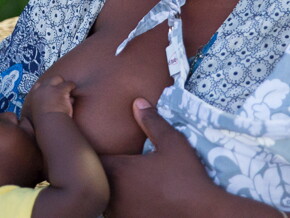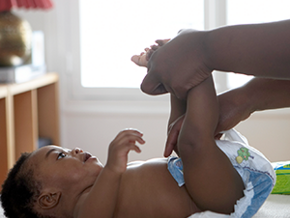
Depending on her level of hunger, your baby’s cues may become very obvious to you. The longer her hunger cues goes unanswered, though, the more vocal and focused she will be to communicate that she’s hungry.
The Birth Stage
Typical hunger cues
- She will initially be calm and alert, with rapidly moving eyes.
- She will root by turning her head and opening her mouth, as you touch the corner of it with your clean finger.
- She may begin to eagerly suck on her hands and smack her lips.
- If her hunger cues are still unanswered, she’ll begin to fuss, then cry.
Typical signs of fullness
- She will no longer be interested in feeding.
- Rooting for your breast will stop.
- She will often be calm and relaxed and often fall asleep.
When your baby is about 4 - 6 months old
Typical hunger cues
- By now, you’ve learned her usual cues that let you know that she’s hungry. You’ve tuned into each other’s patterns, so trust this established communication.
- Hand-sucking may continue before becoming fussy, but it may also be a healthy way for her to self-soothe.
- She’ll feed when offered the breast, but stop if distracted and search again to resume her feeding.
- Crying is the last resort, letting you know she’s lost her patience and wants to be fed now.
Typical signs of fullness
- Pulls off the breast and moves her head away.
- No longer shows interest when you offer the breast again.
- She’s now a much more efficient feeder and may be able to complete her feeding in just 5 to 10 minutes.
- She’ll be calm and content after her feeding.
When your baby is about 6 - 12 months old
Typical hunger cues
- Trust the pattern of communication she’s developed that lets you know she’s hungry.
- She’ll become fussy and restless.
- When offered the breast she will feed, but stop if distracted, then search again to resume her feeding.
- Crying is the last resort to letting you know she’s lost her patience and wants to be fed now.
Typical signs of fullness
- She’ll pull off the breast and move her head away.
- No longer shows interest when you offer the breast again.
- She’s now a much more efficient feeder and may be able to complete her feeding in just 5 to 10 minutes.
- You will notice she becomes calm and content after her feeding.
GOOD TO KNOW
Recognizing and understanding the importance of hunger and fullness cues can help develop healthy eating habits.
















